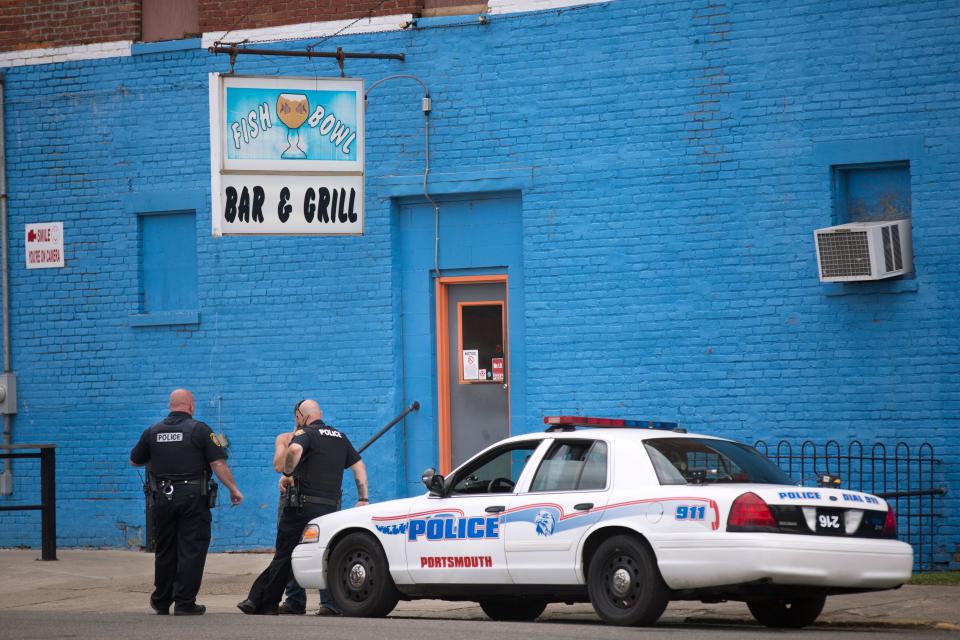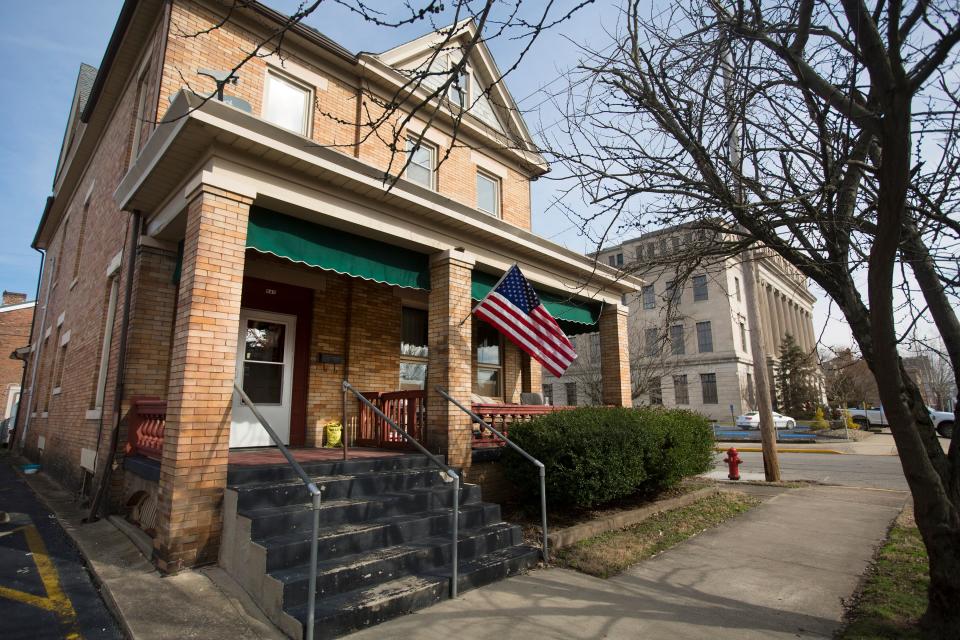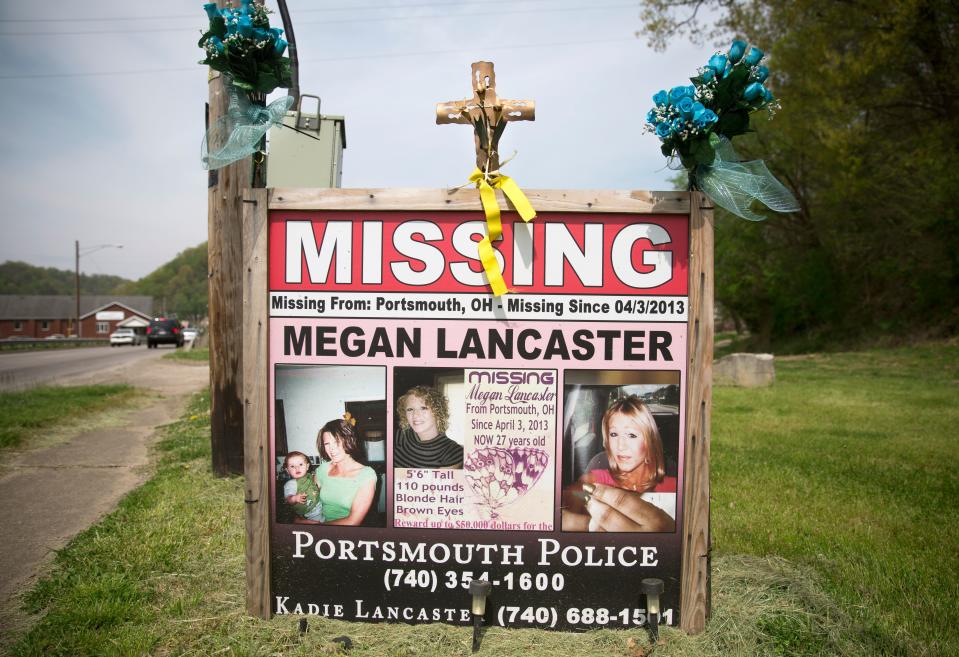Drugs, sex trafficking and missing women: Small Ohio town haunted by dark allegations

PORTSMOUTH, Ohio – On a clear morning, the four-story Scioto County Courthouse casts its shadow over the smaller brick building just across Court Street, where criminal defense attorney Michael Mearan lives and operates his namesake legal practice.
Mearan, 73, is a one-time city councilman who since the 1970s has been a fixture in this small but troubled town along the Ohio River, which separates southern Ohio from northeastern Kentucky.
The area was once dubbed “America’s pill mill,” and when Mearan shuffles over to the courthouse in his rumpled suit, it’s often to represent someone in the relentless grip of opioid addiction.
But according to a federal wiretap affidavit, which was filed under seal with the Southern District of Ohio but was obtained by The Enquirer, Mearan is not just a jowly, silver-haired local attorney.
The 80-page affidavit states that Mearan is also a prolific sex trafficker who for decades has supplied his young, female clients with drugs “in exchange for and as an incentive to participate in acts of prostitution.”
The affidavit – filed in August 2015 by a senior special agent with the U.S. Drug Enforcement Administration – casts Mearan as a central figure in a drug and sex trafficking ring operating throughout the Midwest.
The agent linked to Mearan 27 women who worked for him as prostitutes, including one who has been missing since 2013 and another found dead of “multiple traumas” the same year.
The agent added that Mearan has been “known to law enforcement” in Portsmouth since the 1970s and has been indirectly tied to multiple prior FBI investigations into human trafficking, extortion, violent gangs and “White Slave Trafficking.”

The DEA investigation appears to have concluded in October 2016, when the last of eight defendants pleaded guilty to conspiracy to distribute heroin and other drugs.
Mearan, however, was not among those charged. The allegations concerning him remain investigative findings in a sworn affidavit that have not been proven in court.
Rumors about Mearan, sex trafficking and local corruption have been something of an open secret in Portsmouth for years. And those tales gained credibility in December 2017 after an ex-reporter with the Portsmouth Daily Times posted excerpts of the DEA affidavit on a Facebook page.
But the lack of follow-through by any investigative body has fueled suspicions in Portsmouth that complicit local authorities let Mearan trap women in a cycle of drug abuse and sexual servitude, and that outside agencies simply don’t care about the social and economic horrors afflicting forgotten Rust Belt towns like theirs.
Enquirer reporters picked up where the DEA affidavit ended by spending a year visiting Portsmouth to investigate the allegations concerning Mearan. The effort included interviews with more than 65 individuals and a review of hundreds of documents, including arrest and court records.
Among those interviewed were 10 women who separately shared accounts of working for Mearan as a prostitute at various times over the last two decades. Records show that Mearan had represented six of the women facing drug charges.

The Enquirer
Those women said Mearan, as their defense attorney, promised lenient sentences from judges he knew and parole officers who would ignore probation requirements – as long as the women were willing to have sex for money.
Mearan, they said, would give them money to feed their drug habits and arranged sexual liaisons with men in Portsmouth, Cincinnati and Columbus, and out-of-state trips to New York, New Jersey, Louisiana and Florida.
The women say they earned anywhere from $200 to $2,000 per encounter, and that either the men involved or Mearan himself handled the payment.
In two interviews with The Enquirer, Mearan – who was sometimes joking and dismissive and other times angry and combative – consistently denied any suggestion that he had engaged in prostitution or sex trafficking. At one point he said he didn’t even know what a sex trafficker was and asked for a definition.
Mearan said the accusations about him are due to “jealousy” and are “totally false.”
“That affidavit was the product of a couple gals that the FBI tried to set me up,” he said. “This affidavit that you have says that they’ve been investigating me since the '70s. Now, you think in 50 years they would have maybe come up with something?”
A spokeswoman for the DEA, which does not handle sex trafficking or other offenses unrelated to drugs, said the agency had forwarded “information regarding possible corruption and prostitution” stemming from the heroin investigation to the FBI.
“It is unknown what if any investigation was initiated by the FBI as a result of our tip,” DEA spokeswoman Cheryl Davis wrote in an email last year.
Todd Wickerham, special agent in charge of the FBI’s Cincinnati office – which includes Portsmouth in its jurisdiction – said he does not know what happened to the DEA investigation after the initial drug convictions.
“I don’t have any other information on this, but if we get credible information on a human trafficking ring we would absolutely act upon that,” Wickerham said.
Sources with firsthand knowledge told The Enquirer that there is, in fact, an ongoing investigation into Mearan by multiple law enforcement agencies. The sources requested anonymity because they were not authorized to disclose the existence of an active investigation.
Besides Mearan, the women who spoke with The Enquirer collectively named several well-known individuals from the Portsmouth area who they alleged had paid to have sex with them. The list includes former police officers, lawyers, a medical professional, a former high school football star, businessmen and probation officers. The Enquirer is not naming the men unless the allegations against them have been otherwise corroborated.
Almost all of the women interviewed asked to remain anonymous, citing their fears of Mearan’s connections to a corrupt law enforcement system as well as unsolved deaths or disappearances of more than a dozen women in southern Ohio this decade.
During interviews, some of the women cried, visibly trembled or stole furtive glances over their shoulders to make sure they couldn’t be overheard.

“I’m scared. I’m not gonna lie,” one woman wrote in a message to reporters. “I have to live here. I’m on eggshells right now. U don’t know this town.”
“My family is kinda scared for me to talk. Too many missing woman (sic),” another wrote. “I know I want to be a part of putting a stop to it. But I also have family to protect.”
Only one of the women, Heather Hren, agreed to have her name used in this story.
Hren, 37, said Mearan arranged for her to have sex with a Cincinnati doctor for $200. On another occasion, she said Mearan brought her to the probation office, where an officer took naked pictures of her in exchange for letting her avoid community service obligations. She said she also performed oral sex for a different probation officer.
It was like “walking into your own death or into your own prison,” she said. “Because now you’re stuck."
For close to three years, Mearan “trafficked me to his friends or pimped me out,” Hren said.
Although Mearan hadn’t forced her into prostitution, she said his law enforcement connections and her addiction ultimately left her feeling trapped.
“It wasn’t like you could go to the police department,” Hren said. “There is no one that these girls can tell... Everybody's in each other's pocket."

The ‘EUBANKS/MEARAN organization’
Portsmouth once was an economic rival to cities such as Cincinnati, and in the 1930s was home to a National Football League team.
But like other small, factory towns in certain parts of America, Portsmouth’s manufacturing base started collapsing in the 1970s. With a population of roughly 20,000, nearly half as many people live in Portsmouth today than during its heyday of the 1940s, when it was the country’s shoemaking capital.

Scioto County, where Portsmouth is the county seat, is one of the poorest and least employed regions in the state. In downtown Portsmouth, boards are as prevalent as windows, and former department stores and office buildings now house low-end apartments for the elderly. Prostitutes walk the streets day and night near an abandoned shoe factory east of town.
The area has been especially hard hit by drug abuse – mostly prescription painkillers, fentanyl and heroin. The Portsmouth City Health Department recorded nearly 120 deaths from drug overdoses in just the past three years.
Sex trafficking cases
The number of sex trafficking cases discovered through calls from the National Human Trafficking Hotline has more than doubled this decade.

SOURCE: National Human Trafficking Hotline/The Polaris Project
The Enquirer
“The conditions are ripe for human trafficking,” Scioto County Prosecutor Shane Tieman said. “You have drug addiction rampant. You have unemployment. You have poverty. You have a built-in group of folks who are desperate, maybe hopeless, that could be preyed upon.”
According to DEA Senior Special Agent Keith Leighton, that’s exactly what was happening.
Leighton’s August 2015 affidavit sought and received authorization from a U.S. District Court judge to set up a wiretap on phones used by Mark Eubanks, a suspected heroin, Oxycodone and steroids dealer.
The affidavit details a sprawling investigation that had been underway for at least 20 months. Agents had installed a GPS tracking device on Eubanks’ gold Hummer H2; surveillance teams followed him and documented with whom he met; a hidden camera behind Eubanks’ residence recorded when he came and went; agents sifted through Eubanks’ garbage in search of evidence; and at least four confidential sources provided agents with incriminating information.
The DEA investigation listed 13 “target subjects,” and while Eubanks is named the primary target, the affidavit depicts Mearan as just as important a figure.
Leighton wrote that the investigation “was predicated on the illegal activities” of Mearan and at one point refers to the criminal enterprise as the “EUBANKS/MEARAN organization.”
The affidavit reveals a symbiotic relationship between the duo in which Eubanks supplied drugs and prostitutes to Mearan, and Mearan arranged for the women to have sex for money and represented arrested associates so he could use his connections to secure favorable treatment.
Mearan also warned Eubanks about active investigations and once gave him the identity of a confidential informant sent to make drug buys from Eubanks, the affidavit states.
MORE IN THIS SERIES
The affidavit notes that there were more than 200 phone calls and text messages over a one-year period between the men and that a surveillance team watched Eubanks arrive at Mearan’s law office one day toting a thermos that agents suspected concealed $1,600 in cash.
Federal prosecutors with the Southern District of Ohio indicted Eubanks in October 2015, and he pleaded guilty to conspiracy to distribute heroin. He was sentenced to 150 months in federal prison.
Eubanks, 37, declined to comment when reached at the Federal Correctional Institution in Morgantown, West Virginia.

‘I'm a pretty decent lawyer’
Mearan’s law office is on the ground floor, adjacent to a bedroom separated only by a sliding door. His bedroom used to be on the second floor, but the stairs now make the trek too arduous.
During two separate interviews, his phone seemingly never stopped ringing. His secretary shuttled in and out to deliver paperwork for him to address. At least three potential clients knocked on his door in search of help. A pack of mixed-breed rescue dogs roamed about in search of attention. And his adult daughter yelled at reporters to leave her father alone.
Mearan, who has no known criminal history, said the details in the DEA affidavit shouldn’t be taken seriously because agents relied on confidential informants looking to cut deals to reduce their own sentences.
“I make my living as a lawyer, and I think I’m a pretty decent lawyer,” Mearan said. “I’m not going to stoop to defending myself against these people.”
The affidavit acknowledges that some of the informants are cooperating in exchange for consideration on drug charges. But it also notes that the sources have “provided reliable intelligence information to law enforcement authorities in the past.”
Three of the four confidential sources in the investigation are associated with Mearan, not Eubanks, according to the affidavit. Most of the sex trafficking allegations concerning Mearan appear to come from either those sources or more than two dozen unnamed women who are not specified as confidential sources.

The affidavit notes that information about Mearan was obtained during prior federal investigations and from "numerous complaints" the FBI has compiled about him.
One unnamed source – identified as a former prostitute of Mearan’s – reported that he would give her $100 every time she introduced him to a new woman. Another confidential source said Mearan arranged a 2014 trip for her and a second woman to fly to Palm Beach, Florida, to have sex with two subjects from New Jersey.
Airline records, photos and telephone records corroborated the Florida rendezvous, according to the affidavit.
Some of the damning information about Mearan is presented in the affidavit as not coming from a source but as a fact, with no qualifications about its veracity.
For example, it flatly states that Daren Biggs, one of the 13 targets of the investigation, “has been supplied with prostitutes in the past” by Mearan. Biggs, who was not charged in the case, could not be reached for comment.
Lindsey Porter, another target who was ultimately not charged, “used to work for Mearan as a prostitute,” according to the affidavit.
Porter declined to comment when reached in prison, where she is serving a sentence on charges unrelated to the DEA investigation.

‘There used to be a code in this county’
The affidavit cites two Portsmouth individuals who are not named as targets of the DEA investigation, but who are implicated as Mearan's associates.
Frederick Brisker, 68, a former high school football star who became a well-known financial adviser in Portsmouth, is alleged to have helped Mearan coordinate the sex trafficking operation.
“The prostitutes are provided drugs and paid cash for their services by Mearan and their dates with clients are scheduled by Mearan and Brisker,” the affidavit states.

Brisker has no known criminal record. His financial firm fired Brisker in March 2018 for allegedly forging the signature of another insurance agent. Brisker also has state and federal tax liens that, as of January, total more than $566,000.
Brisker declined to comment. In an email, he referred questions to Mearan, whom he called his personal attorney.
“I guess Fred Brisker’s biggest vice is that he’s a friend of mine,” Mearan said. “Fred would give you the shirt off his back.”
The other individual is not named in the affidavit, but is referred to several times as a Portsmouth judge “in collusion” with Mearan. It alleges that Mearan provided the judge women, according to information “obtained through numerous interviews, including interviews with former prostitutes.”
Some of the women interviewed by The Enquirer said the judge in question is former Common Pleas Court Judge William Marshall.
Marshall, 62, denied any involvement with drugs or prostitutes.
“Are you serious? I would never do anything like that,” he said.
He declined to comment further.
Marshall retired last year amid controversy after spending 16 years on the state bench. State officials found he improperly confronted Ohio State Highway Patrol officers who had written his daughter a speeding ticket.
The state Supreme Court last month suspended Marshall from practicing law for six months due to the incident. Marshall explained his behavior to a county prosecutor by saying: “I didn’t like the trooper. He didn’t listen to me. There used to be a code in this county – I’m a judge and he shouldn’t have written my daughter" a ticket.

The ‘number one girl’
The manufacturer of Oxycontin – the brand name of a powerful opioid painkiller – recommends an introductory dose of 10 mg every 12 hours.
Hren said that in 2006, at the peak of her addiction, she was taking 160 mg a day.
She said she was desperate for cash when a friend suggested she could make some money if she was willing to “do a little dance for” Mearan.
Hren said she was hesitant at first but gave in.
“When you're needing extra money for drugs, you get to a point where definitely you want to do whatever it takes,” she said.
Hren said she quickly became Mearan’s “number one girl” as he arranged for her to have sex with numerous men, including Brisker.
“I was made to feel like I had to do those things and that there wasn't really any getting out,” she said.
If she left, she said, she was worried Mearan might use his connections to have her sent to prison – or worse.
Hren said she was scared that she “would disappear,” or that “they would kill me and get rid of me and that would be the end of it.”
After nearly three years, Hren said she was able to escape when she secured a few thousand dollars in a workers' compensation settlement related to an injury in a medical office job.
She used the money to relocate to another city in Ohio and said she is working to stay sober. She has a job in the medical field and is raising two children.
"I’m one of the few who got away,” she said. “I’ll make sure that I have a roof over our head and we don’t have to depend on a nasty sugar daddy to pay for it.”

‘Men who give money’
Like Hren, many of the women who spoke with The Enquirer pointed to the case of Megan Lancaster, a prostitute who disappeared from Portsmouth in April 2013. Police found her white Ford Mustang outside the Rally’s fast food restaurant with her wallet left on the front seat.
Lancaster’s disappearance is referenced in the DEA affidavit.

Lancaster’s sister-in-law, Kadie Lancaster, said she understands why women in Portsmouth are afraid to talk.
“You could be the next Megan Lancaster if they think that you know something that you could tell,” she said.
Kadie Lancaster has continued to dig into what happened to Megan. She keeps one of Megan’s bras in the freezer, just in case it has DNA evidence, and compiled a 5-inch thick binder filled with documents that she considers potential clues.

The binder contains 246 different names and phone numbers that Megan kept in color-coded notebooks. The entries include notations like “dance for” and “men who give money.” Mearan’s name and number are there, along with both notations.
Kadie Lancaster said she has called nearly every phone number in the notebooks. One man who answered was a retired police captain, she said.
“He said he didn’t know what I was talking about,” Kadie Lancaster said. “Then why did she have his number, and it was the right number, and he answered?”
Portsmouth Police Chief Robert Ware declined to comment on “the existence or status of any possible investigation.”
If any previous Portsmouth police were involved, Ware said, it would be “disappointing, because all that does is bring a scar to law enforcement.”
“I am confident that the law enforcement that is in office right now is doing everything in their power to keep the community safe,” Ware said.
Scioto County Sheriff Marty Donini said it’s the scope of the activity described in the affidavit, and not the clout of the people who may be involved, that would hamper an investigation by local authorities.

"If it's that big a deal, and it's that far-reaching – out of state, out of country or whatever – I just don’t think we have the ability, the manpower or resources to do it," Donini said.
One of the women who still lives in Portsmouth said now is the time for those involved to speak out.
The women are “used up and thrown away and discarded like they’re trash, and you know they’re not trash. They’re in an emotional wreck. They are chaos. They need help and they’re not getting the help they need.”
If you or someone you know needs help:
National Human Trafficking Hotline: 1-888-373-7888
Drug Helpline: 1-888-633-3239
If you know more about these allegations, please reach out to The Enquirer at Portsmouth@enquirer.com.

The team behind this investigation
Reporting and research: James Pilcher, Liz Dufour, Kate Murphy
Editing: Bob Strickley, Matt Doig, Beryl Love
Photography: Liz Dufour
Videos: Liz Dufour, Kate Murphy, Mike Nyerges
Drone footage: Michael McCarter and Sam Greene
Graphics and illustrations: Mike Nyerges
Digital production and development: Spencer Holladay, Jason Bredehoeft, Annette Meade
Copy editing and design: Jim Calhoun, Spencer Holladay, Jason Bredehoeft
Social media, engagement and promotion: Sallee Ann Ruibal, Andrea Brunty
This article originally appeared on Cincinnati Enquirer: Drugs, sex trafficking and missing women: Small Ohio town haunted by dark allegations

